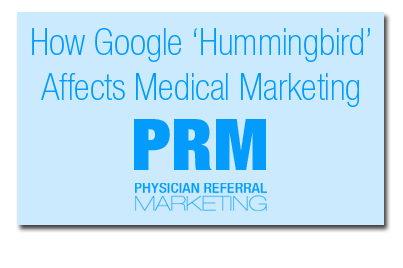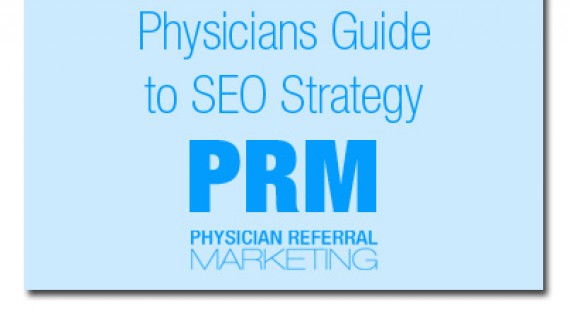How Google Hummingbird Affects Medical Marketing
Google Hummingbird affects medical marketing in a huge way, and if you’ve been using underhanded ‘black-hat’ techniques or dealing with a disreputable company, you may been in for a rude awakening.
When you search for something on Google, results vary based on location, individual, time of day, and social site interaction – multiple factors are taken into account in the search results displayed by Google’s ever-changing algorithms. We’ve talked about social cues and semantic search before, but Google’s latest algorithm change, known as Hummingbird due to ‘fast and precise’ results, is set to take what we already know about SEO and amplify it. Long gone are the days of trying to trick search engines into establishing a higher rank- with the launch of Hummingbird, those tricks will fail rapidly.
So what exactly do you need to know about Hummingbird and its impact on your SEO efforts? As stated in this Forbes article: ‘The key to making the right decisions about SEO is to understand where Google is going. Google’s goal is that when someone creates a new search, what Google shows that person is exactly what the person wants or needs. ‘ The algorithm update focuses on two main points:
- As more people speak into their phones to search (ala Siri on the iPhone), Google had to adapt their formulas to allow for more complex, natural searches. Think of the difference between searching for “fast food” when typing into the search engine, versus “where can I find a quick, good meal in Houston?”
- Google is relying much more heavily on the social cues the individual user sends to them. For example, if you’re signed into your Google+ account and have previously liked a certain restaurant, links to their website will more reliably show up in your search results. Likewise, those individuals you interact with the most on social networks will start impacting your results- the thought process here is that if you trust them, then you’ll likely agree with the things they like. When your friend ‘likes’ that cute little bistro in your town, the next time you search for a bistro, their ‘recommendation’ will come up reliably.
Sound like a complex, nearly impossible thing to manage? It should, because it’s designed that way. Google has been fighting spammy marketers and black-hat SEO hacks for years, and this latest iteration of their algorithm is designed to virtually eliminate the possibility of scamming search results.
As you develop your marketing & SEO plan, it’s crucial to keep this personalization of searches in mind. A solid long-tail keyword strategy is absolutely necessary, and one of your primary objectives should be relationship marketing that establishing rapport & loyalty, as well as engagement. Those patients you have who love what you’ve done for them? Urge them to leave you a review on Google+, Yelp, or anywhere else. New patients? Make it a priority for them to follow & interact with you on social media.
Think you’ll be able to avoid adapting to changes in SEO due to a strong Adwords campaign? Think again. You likely already know that your PPC rates are affected by the relevancy of the website being advertised, i.e. your Google Quality Score; without adapting your SEO & marketing strategy to include social interaction and natural keyword search terms, you’ll be priced out of the game as your Quality Score plummets.
[schema type=”organization” orgtype=”Corporation” url=”www.physicianreferralmarketing.com” name=”Physician Referral Marketing” description=”Medical & healthcare marketing for specialty physician practices” street=”900 Wilshire Blvd ” city=”Troy” state=”MI” postalcode=”48084″ email=”hello@physicianreferralmarketing.com” phone=”888-336-1344″ ]






Ok, now this is really interesting. I never would have guessed that those voice-to-text things had that much of an impact, but I definitely see how it can be true. What would be your advice on how to figure out what phrases people are using to find, say, a cardiologist?
great post